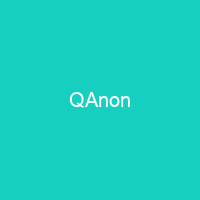What Is QAnon?
QAnon, a far-right American political conspiracy theory, has taken the internet by storm since its inception in 2017. It revolves around an anonymous figure known as ‘Q,’ who posts cryptic messages on online forums claiming to reveal secrets about a global cabal of child traffickers and Satan worshippers.
At its core, QAnon believes that President Donald Trump is leading the fight against this shadowy network. The theory has gained traction among a wide range of followers, from political activists to conspiracy theorists, each interpreting ‘Q’s’ clues in their own unique way. But what makes QAnon so compelling—and concerning?
The Origins and Spread of QAnon
QAnon first appeared on 4chan’s /pol/ board in October 2017, where an anonymous user began posting cryptic messages under the pseudonym ‘Q.’ These posts suggested that a massive child trafficking ring was operating within the government, and that President Trump was secretly fighting against it. The theory quickly spread beyond its online origins, becoming a viral phenomenon with followers around the world.
Key Figures in QAnon
Michael Flynn, former National Security Advisor, became a prominent figure among QAnon supporters after he endorsed the conspiracy theories and even created a media company called ‘Digital Soldiers’ to promote them. Similarly, Lin Wood and Sidney Powell, both controversial lawyers, have been vocal advocates of QAnon beliefs.
The 2020 Election and Beyond
During the 2020 U.S. presidential election, QAnon followers played a significant role in spreading misinformation and supporting Trump’s legal team in their attempts to overturn the results. The January 6, 2021, attack on the U.S. Capitol was partly fueled by QAnon beliefs, with several participants openly declaring their support for the conspiracy theory.
The Impact of QAnon
QAnon has had a profound impact on American politics and society. It has been linked to acts of violence, including the storming of the Capitol building. Social media platforms have taken steps to curb its spread, but QAnon followers have found new ways to regroup on alternative platforms like Parler and Telegram.
QAnon’s Global Reach
The conspiracy theory has a global following, with dedicated communities in countries such as Canada, Australia, Spain, and Latin America. In some cases, QAnon has merged with other local conspiracies, creating unique hybrid theories that spread fear and misinformation.
QAnon’s Core Beliefs
The central tenet of QAnon is the existence of a global cabal of child traffickers and Satan worshippers. Followers believe this cabal controls politicians, mainstream media, and Hollywood. They see President Trump as leading a secret battle against these evil forces.
Failed Predictions and Persistent Belief
Despite numerous failed predictions about the outcome of elections or the release of evidence, QAnon followers continue to believe in the theory. This persistence is partly due to the way ‘Q’ posts are interpreted—followers often find ways to reinterpret incorrect predictions as part of a larger plan.
The Future of QAnon
While QAnon may have lost some mainstream support, its core beliefs continue to influence certain segments of society. The conspiracy theory has merged with other fringe movements and continues to evolve, adapting to new events and technologies.
QAnon remains a potent force in the digital age, blending fear, misinformation, and political activism into a dangerous cocktail that threatens democratic norms and public safety.

You want to know more about QAnon?
This page is based on the article QAnon published in Wikipedia (retrieved on November 30, 2024) and was automatically summarized using artificial intelligence.







